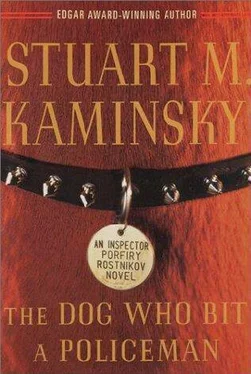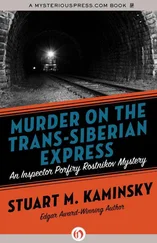Stuart Kaminsky - The Dog Who Bit a Policeman
Здесь есть возможность читать онлайн «Stuart Kaminsky - The Dog Who Bit a Policeman» весь текст электронной книги совершенно бесплатно (целиком полную версию без сокращений). В некоторых случаях можно слушать аудио, скачать через торрент в формате fb2 и присутствует краткое содержание. Жанр: Полицейский детектив, на русском языке. Описание произведения, (предисловие) а так же отзывы посетителей доступны на портале библиотеки ЛибКат.
- Название:The Dog Who Bit a Policeman
- Автор:
- Жанр:
- Год:неизвестен
- ISBN:нет данных
- Рейтинг книги:3 / 5. Голосов: 1
-
Избранное:Добавить в избранное
- Отзывы:
-
Ваша оценка:
- 60
- 1
- 2
- 3
- 4
- 5
The Dog Who Bit a Policeman: краткое содержание, описание и аннотация
Предлагаем к чтению аннотацию, описание, краткое содержание или предисловие (зависит от того, что написал сам автор книги «The Dog Who Bit a Policeman»). Если вы не нашли необходимую информацию о книге — напишите в комментариях, мы постараемся отыскать её.
The Dog Who Bit a Policeman — читать онлайн бесплатно полную книгу (весь текст) целиком
Ниже представлен текст книги, разбитый по страницам. Система сохранения места последней прочитанной страницы, позволяет с удобством читать онлайн бесплатно книгу «The Dog Who Bit a Policeman», без необходимости каждый раз заново искать на чём Вы остановились. Поставьте закладку, и сможете в любой момент перейти на страницу, на которой закончили чтение.
Интервал:
Закладка:
“Something has happened to me, Maya,” he said.
She said nothing. He went on.
“I would normally be depressed now, afraid of losing you and the children, dreading the need to face my mother, cursing my work. But I’m not. I feel calm, as if the things that usually get to me are not important. I don’t want you to go. I will surely weep.
But if you must, I’ll try to understand. You surely have reason to leave.”
“You are reacting to being alive when you should be dead, Sasha,” she said softly, her head down. “Lydia is right. You should try to do something less dangerous, but I know you will not.”
She was right.
“Maya, I did it again. The weakness came. I became a different person, Dmitri Kolk, criminal.”
“You were with a woman,” said Maya. “I knew. I could tell from the guilt in your voice on the phone. Did she have a name?”
“Tatyana,” he said.
“Was she pretty?”
“Thin, but pretty, yes.”
“Did you have to do it? Would the people you were with be suspicious if you didn’t?”
“Maybe. No,” Sasha said, “I was drunk. I was playing a role.
Forgive me if you can, but I was enjoying playing that role.”
Maya turned her head toward him. “Sasha, you just told me the truth.”
“I know.”
“You have always lied in the past.”
“Yes. I told you. Something has changed. Don’t go, Maya.”
“Twenty-two days’ trial,” she said. “I’m not threatening you, Sasha. It just seems reasonable, enough time to see if you’ve really changed.”
“Twenty-two days,” he said. “An odd number.”
“I took a leave from work,” she said. “I have twenty-two days.
We can spend time together. I’m not sure I have much hope. I’ll call my office in the morning and say I might like to come back. They’ll be happy to have me. No one else knows the billing system program.”
Maya worked for the Council for International Business Advancement. She liked the job. She did not want to lose it. She would decide what to do about the Japanese businessman when the need to decide arose. What she would do would depend primarily on Sasha.
“Would you like to get under the covers and make love?” she asked.
“What?”
“I still love and want you,” she said, “I’m just not sure I can live with you.”
“I would like very much to make love. The moment you asked the question, I was immediately. . I love you, Maya.”
“I know, Sasha Tkach,” she said. “But that is not enough.”
Iosef sat in his small, comfortable one-room apartment trying to read a play by a new writer named Simsonevski. Simsonevski had three plays produced in the last year, all in the little theaters in storefronts or the back rooms of shoe stores or churches. Iosef had seen all of the plays, liked none of them. The one in his lap-he was wearing only his underwear and a plain white T-shirt-was even more grim than the others. There had been one suicide, one murder of a husband by a wife, one young woman going insane (with a stage note indicating that she should bite off her tongue), and a soldier who has an epileptic seizure onstage.
Iosef laughed. It was that or cry, but on balance the laugh was called for. He put aside the play knowing he would not pick it up again. It was very late but he thought he would try to find something on television, anything but the news.
He could not match the tragedies of Simsonevski’s play but he could beat it for simple irony. First, the Yak had purposely allowed Yevgeny Pleshkov to go free of a crime he surely committed. The Yak was not one to take bribes. From what Iosef could see, Yaklovev was not interested in material things. Porfiry Petrovich had told him that the Yak lived alone and simply. His wardrobe each day confirmed this in part. No, money was not the culprit in this injustice. Did Pleshkov or the woman have something on the Yak? Iosef didn’t think the Yak would stand for blackmail even if they did have something. He would find a way out. It was something Iosef would discuss tomorrow with his father.
But the problem of the Pleshkov case was less vexing than Iosef ’s embarrassment over arresting the man in the courtyard outside of Anna Timofeyeva’s window. The man proved to be the woman’s brother, a construction worker, not the woman’s husband.
Anna had been right about who the woman was, but Iosef had now revealed that her place of hiding and change of name were known.
They had alerted her, and she would alert her fugitive husband.
Anna Timofeyeva slept through the capture, and when she was told about it when she awakened, she shook her head and said,
“You should have awakened me. I know what the husband looks like.”
That was all she said. She asked them if they wanted tea, which she disliked but drank because she thought it might be good for her. As Anna had moved toward the stove, Iosef and Elena declined the offer of tea and told her that they planned to marry.
Anna went to the small sink in the corner, filled her teapot with water, and turned on the gas on the stove.
“I know,” Anna said.
“How would you?” asked Elena, standing next to Iosef. “I didn’t know he would ask. I didn’t know I would say yes.”
“I knew,” said Anna, rummaging for a tea she might find drink-able.
“You approve?” asked Elena.
“I approve,” said Anna, making a choice of teas, the least of the four evils on the shelf.
“When?”
“We haven’t discussed that,” said Iosef.
“No,” said Anna, pushing the tea she had selected back in the narrow cupboard over the sink.
“No?” asked Elena.
“Tonight I take you both out for dinner,” she said. “An old woman with a bad heart, a young woman with a bad arm, and a man who has made a fool of himself. The perfect trio for celebrat-ing. I still have friends, even a friend or two with a restaurant.”
And they had celebrated at an Uzbekistani restaurant where Anna knew the owner, a former cabinet minister who had once needed the help of the stern procurator.
They had eaten well- tkhum-duma, boiled egg inside a fried meat patty; mastava, a rice soup with chopped meat; maniar, a strong broth with ground meat, egg, and bits of rolled-out dough; a shashlik mar-inated and broiled over hot coals. They had laughed, though Elena was in pain from time to time, and they had made some prelimi-nary plans. She had said that she would like to wait a few months before a wedding, to be sure they had not been carried away by a romantic moment. This seemed reasonable to Iosef.
By the time he got to his room, it was too late to call his parents.
Iosef ’s stomach was contentedly full. That, and Elena’s acceptance of him, made it just a bit easier to face the embarrassment at Petrovka in the morning.
Iosef ’s room had theater posters on each of the four walls, bright theater posters except for the one for the self-indulgent play Iosef had written and starred in. That poster held a place of prominence to remind him that he was not a playwright. He had a two-cushion, sturdy yellow sofa with black trim, two chairs, a worn but still colorful handmade Armenian rug that covered most of the floor, and a desk in one corner. The couch opened into a bed in which Iosef slept. There were three bright floor lamps, one black-painted steel, one a mock Tiffany, and the third a brass monstros-ity from the 1950s. The room was bright. Next to the desk was a small table on which the television sat. The rest of the wall space on all four walls was filled by floor-to-ceiling bookcases he had made himself.
He supposed that after he and Elena were married, this is where they would live.
It could have been worse. He had his own toilet and shower behind the door off the kitchen area. The sink, toilet, and shower functioned perfectly since Porfiry Petrovich had worked on them.
Читать дальшеИнтервал:
Закладка:
Похожие книги на «The Dog Who Bit a Policeman»
Представляем Вашему вниманию похожие книги на «The Dog Who Bit a Policeman» списком для выбора. Мы отобрали схожую по названию и смыслу литературу в надежде предоставить читателям больше вариантов отыскать новые, интересные, ещё непрочитанные произведения.
Обсуждение, отзывы о книге «The Dog Who Bit a Policeman» и просто собственные мнения читателей. Оставьте ваши комментарии, напишите, что Вы думаете о произведении, его смысле или главных героях. Укажите что конкретно понравилось, а что нет, и почему Вы так считаете.












